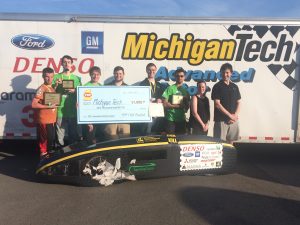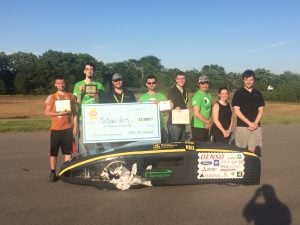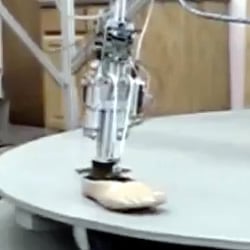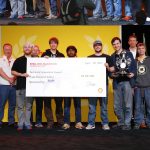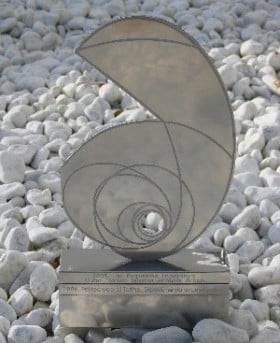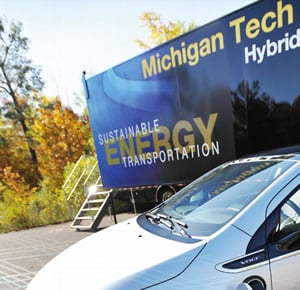The ME-EM Senior Recognition Banquet and Order of the Engineer Program was held on April 20, 2017.
The keynote speaker was Dr. Robin Johnson-Cash, Technical Training Manager, Ford Motor Company. Cash is a 2015 alumna with a PhD in Mechanical Engineering-Engineering Mechanics.
WATCH THE KEYNOTE ADDRESS. Closed captioning is available.

Spring 2017 Outstanding Student Awards
From time to time we observe exemplary and outstanding performance of an individual or group of individuals in Senior Capstone Design or Enterprise, and when that happens we recognize those students with an Outstanding Student Performance Award.
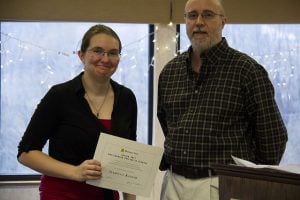
Isabella Kesler, FSAE
Bella joined Formula SAE early in her college career. Bella’s first year on the team marked the beginning of transforming Michigan Tech FSAE from a Monster Garage operation to a race team with a purpose, a plan, and a return to yearly competition. As a new member, Bella learned that building a successful race car requires hard work and dedication. As an FSAE Leader, Bella demonstrated this to her to her teammates. Bella finds out what needs to be accomplished and gets it done. She has a can-do attitude as a team member, SAE Board member, and electrical and controls leader. As President this year, Bella made sure that the team met every competition deliverable on time. Bella was always at the shop working on the cars, preparing competition documents, and occasionally doing homework. Her degrees show mechanical and electrical engineering, but her dedication has been to Formula. Isabella Kesler is the model Outstanding FSAE Member.
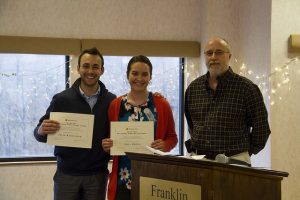
Erica Huhta and Jacob Kendziorski, SCD 4
Erica and Jake have gone above and beyond within Team 4, which was already a great team to work with as an Advisor. One of the most outstanding qualities of Jake and Erica is their level of professionalism and work ethics. From the first day to the very last one, they have been the driving force and have striven for success and perfection throughout the project. Jake has delivered an outstanding performance and beyond his profound contributions to the team in motion simulation and manufacturing he has shown exceptional leadership skills. Erica, beyond her responsibilities as communication liaison and technical contributions to the team, has kept the team on track and has shown exceptional leadership and professionalism.
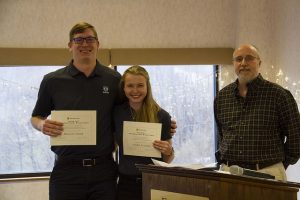
Mike Fischer and Lauren Tetzloff, SCD 7
Mike Fisher and Lauren Tetzloff have both been exceptional and integral members of Team 7. For both semesters Mike usually ran the meetings, and has been involved with all aspects of the project from brainstorming all the way to testing. In the first semester Lauren did most of the CAD layout and kinematics work. She carried a large part of the work-load and played a key role in every aspect of the project. During the project both Mike and Lauren have been very professional and hard working. The team would not have been as successful without them.
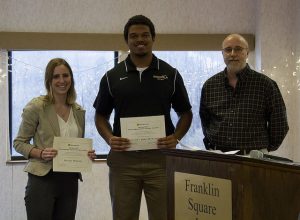
Rachel Pohlod and Cayman Berg-Morales, SCD Team 11
As many of you are aware, the ME undergraduate curriculum has undergone a major change recently. That change has challenged students to learn more about implementing modern model-based simulation and analysis tools. This pair of students stood out in taking what they learned in ME Practice, engaging on their own knowledgeable faculty, and taking MotionView far beyond what they had previously learned to simulate sliding, impact, contact and settling (and not tipping over) of gear blanks working their way through the automated handling and inspection system for MacLean-Fogg Component Solutions. For this work, we recognize Rachel Pohlod and Cayman Berg-Morales.
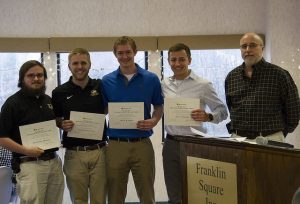
Thomas Tetzloff, Dean Johnson, and Kyle Raboin and Matt Miller, SCD Team 20
As a team, they did a great job, a fully integrated ME and EE team, and represented MTU extremely well at a national venue in the Air Force Research Labs University Design Challenge. On that team there were a few individuals who really stood out in the spirit of what the Outstanding Student Performance Award is here to recognize. For their extreme dedication from design through prototyping to making it work (more than once), this award goes to MEs Thomas Tetzloff, Dean Johnson, and Kyle Raboin and Electrical and Computer Engineer Matt Miller.
ME-EM Teachers of the Year Award
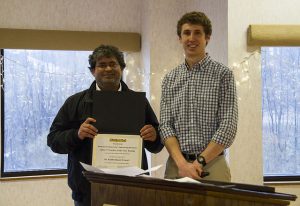
Radheshyam Tewari is a lecturer in the Mechanical Engineering – Engineering Mechanics department at Michigan Technological University since 2014.
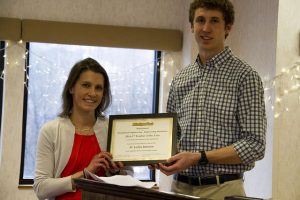
Dr. Jaclyn Johnson is a lecturer in the ME-EM department at Michigan Tech, since 2014.
Photo Galleries
View the MEEM Spring 2017 Ceremonies Photo Gallery
View the MEEM Spring 2017 Capstone Senior Design Poster Session Photo Gallery
